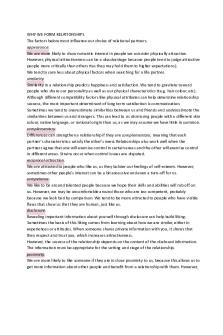Interpersonal Communication - Chapter 5 PDF

| Title | Interpersonal Communication - Chapter 5 |
|---|---|
| Author | Max Whitbeck |
| Course | Interpersonal Communication |
| Institution | Lehigh Carbon Community College |
| Pages | 2 |
| File Size | 97.9 KB |
| File Type | |
| Total Downloads | 62 |
| Total Views | 183 |
Summary
All notes for chapter 5. These notes were really useful, I got great grades on pretty much everything and finished the class with an A....
Description
Fall 2017: Interpersonal Communications Chapter 5: Language The Nature of Language: • Language is symbolic—words are arbitrary symbols, that have no meaning in themselves • Language and worldview: • Linguistic relativism—worldview of a culture is shaped and reflected by the language its members speak • Sapir-Whorf hypothesis is the best-known declaration of linguistic relativity Affiliation: • Building solidarity with others through speech • Convergence- process of adapting one’s speech style to match others • Divergence- speaking in a way that emphasizes difference Preciousness and Vagueness: • Ambiguous language- words and phrases that have more than one accepted definition • Abstraction- generalizing about similarities between several objects, people, ideas, or events • Abstraction ladder- the higher level of abstraction, the more vague the statement becomes o Hard to understand the message o Leads to stereotyping o Thinking in generalities, self-fulfilling prophecies o Serious misunderstandings • Avoid abstractions by using behavioral descriptions • Euphemisms- innocuous terms substituted for blunt ones • Be as kind as possible without sacrificing integrity of the message • Relative language- gains meaning by comparison o Fails to link relative word to a more measurable term o Avoid by using numbers • Static evaluation- assumes people or things are consistent and unchanging o Some capability of change to avoid Language of Responsibility: • Evaluative (emotive) language- reveals how the speaker feels about something • “But” Statement- cancels the thought that precedes it; face-saving • “You” Statement- expresses judgement
• •
“I” Language- assertive, more accurate, less provocative; describes other person’s behavior, describes your feelings and consequences of behavior for you “We” Language- implies that the issue is the concern and responsibility of both the speaker and receiver...
Similar Free PDFs

Interpersonal Communication
- 2 Pages
Popular Institutions
- Tinajero National High School - Annex
- Politeknik Caltex Riau
- Yokohama City University
- SGT University
- University of Al-Qadisiyah
- Divine Word College of Vigan
- Techniek College Rotterdam
- Universidade de Santiago
- Universiti Teknologi MARA Cawangan Johor Kampus Pasir Gudang
- Poltekkes Kemenkes Yogyakarta
- Baguio City National High School
- Colegio san marcos
- preparatoria uno
- Centro de Bachillerato Tecnológico Industrial y de Servicios No. 107
- Dalian Maritime University
- Quang Trung Secondary School
- Colegio Tecnológico en Informática
- Corporación Regional de Educación Superior
- Grupo CEDVA
- Dar Al Uloom University
- Centro de Estudios Preuniversitarios de la Universidad Nacional de Ingeniería
- 上智大学
- Aakash International School, Nuna Majara
- San Felipe Neri Catholic School
- Kang Chiao International School - New Taipei City
- Misamis Occidental National High School
- Institución Educativa Escuela Normal Juan Ladrilleros
- Kolehiyo ng Pantukan
- Batanes State College
- Instituto Continental
- Sekolah Menengah Kejuruan Kesehatan Kaltara (Tarakan)
- Colegio de La Inmaculada Concepcion - Cebu














